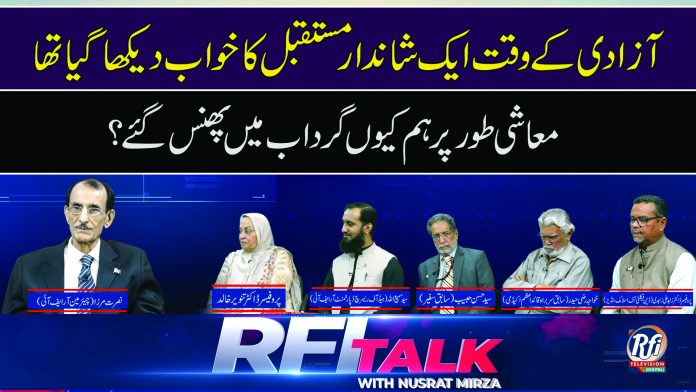In a discussion on RFI Digital TV, experts reviewed Pakistan’s 77 years of political and constitutional history, economic system, foreign policy, and military capability, along with its evolving role in the global landscape. The program, hosted by RFI Chairman Nusrat Mirza, highlighted the unfulfilled dreams envisioned at the time of independence a prosperous and magnificent future that has yet to materialize.
Nusrat Mirza emphasized that Pakistan was meant to be the cornerstone of the Islamic world’s rise and development. While the nation has seen significant successes in various fields, the establishment of a stable political system remains elusive. He urged against despair, pointing to areas where substantial progress has been made.
Professor Dr. Tanveer Khalid, Dean of Social Sciences at Ziauddin University, underscored the importance of dreams and ideology in any movement. She praised Quaid-e-Azam Muhammad Ali Jinnah for laying out a visionary framework for Pakistan’s future. Despite ongoing challenges in constitutional and administrative areas, Dr. Tanveer Khalid expressed optimism that with good governance, effective management, and collective effort, the nation can still realize its founding dreams.
Former Ambassador Syed Hassan Habib highlighted that Pakistan has faced numerous crises due to a persistent lack of visionary leadership. He pointed out that the bureaucracy, which fundamentally lacks vision, has been limited to merely executing orders.
Over the past seven decades, this lack of foresight has led the bureaucracy to misguide the rulers, who themselves have been deficient in vision. As a result, Pakistan’s foreign policy has struggled to achieve success, largely due to inadequate planning.
Khawaja Razi Haider, former head of the Quaid-e-Azam Academy, pointed out that Jinnah envisioned a political system based on Islamic principles, not Western democracy. However, the media’s fleeting attention to Jinnah’s decrees and their exclusion from the educational curriculum has left the younger generation unaware of his true vision.
Dr. Zahid Ali Zahidi highlighted that the Muslim League, at the time of independence, had no concrete agenda for land reform, unlike the Indian National Congress, which implemented reforms soon after independence. This allowed the feudal lords to strengthen their political grip, hindering the implementation of democracy in its true spirit.
In conclusion, Syed Samiullah, Head of RFI’s Research Department, stressed that the nation can achieve its developmental goals if every institution adheres to its constitutional role and if the people embrace collective progress.
He noted that communal and linguistic divisions have obstructed the realization of the founders’ dreams but affirmed that unity and collaboration could bring those dreams to fruition.







